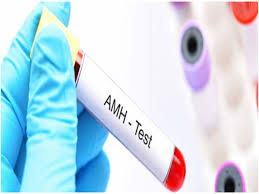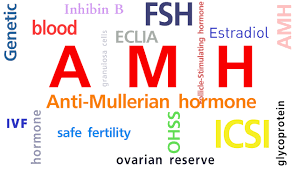Everything you need to know about AMH level and fertility in women
You have probably heard of many acronyms while going for fertility treatments. Some of them are IUI, FSH, IVF, etc. You may have understood them better by now. But there is one more acronym that you need to understand for your own benefit.
AMH Levels And Fertility are closely integrated and in this article, we will delve into the purpose of AMH testing, the significance of anti-mulleraine hormone levels, and how they relate to your reproductive health.
Begin your surrogacy journey with IVF Conceptions today!
Mobile: +91-8800481100 ( WhatsApp, Line, Viber)
Email: neelam@ivfconceptions.com
Web: www.completesurrogacy.com
What is AMH Testing?
AMH or anti-muller hormone is a hormone that is secreted in follicle granulosa cells and is quickly becoming the ovarian reserve “go-to” indicator. AMH is produced in male and female reproductive tissues. The role of AMH depends on your age and sex.
Antimüllerian Hormone (AMH) plays a major role in creating an unborn baby’s sex organs. A baby may begin to develop reproductive organs during the first weeks of pregnancy. The child will have the genes to either become a male (XY genes) or a female (XX genes).
If the baby has male (XY) genes, together with other male hormones, high levels of AMH are formed. It prevents female organs from forming and facilitates male organ development.
If there is insufficient AMH to stop female organs from developing, both sex organs will form. The genitals of a baby may not be clearly identified as male or female when this occurs. This is defined as genitalia which is unclear. Another name is intersex for this disorder.
For women, the level of AMH can provide fertility details, and the potential to become pregnant. The test can also help diagnose menstrual problems and track women’s health with certain types of ovarian cancer.
Read more about this topic:
How can the success rate of the IVF process be increased?
AMH levels and polycystic ovary syndrome (PCOS)

 What is the purpose of the AMH test?
What is the purpose of the AMH test?
An AMH test is a crucial diagnostic tool that measures the levels of anti-mullerian hormone in your blood. Both men and women produce AMH, but for the purpose of this article, we will primarily focus on its relevance to women’s reproductive health.
AMH plays a vital role in the development of a baby’s sex organs while in the womb. In women, AMH is produced by cells inside the follicles of the ovaries, which are responsible for containing and releasing eggs.
The AMH test is often used to verify the ability of a female to produce eggs for pregnancy to be fertilized. During her childbearing years, a woman’s ovaries will produce thousands of eggs.
As a woman gets older, the egg supply decreases so does the AMH level. AMH hormone levels help show the number of potential egg cells left in a female. This is regarded as the reserve of ovaries.
If the ovarian reserve of a woman is high, she may be more likely to become pregnant. She can also wait to try to get pregnant. If the ovarian reserve is small, a woman may have difficulty getting pregnant and should not wait long before attempting to get a child.
AMH tests can also be used to:
- To predict the start of menopause, a phase in the life of a woman when her menstrual cycles have ended and she can no longer become pregnant. This usually begins when a person is about 50 years of age.
- To find out why amenorrhea, is a lack of menstruation. It is most often diagnosed in girls who have not menstruated by the age of fifteen and in women who have missed many cycles.
- To find out why menopause comes early.
- Support diagnosis of polycystic ovarian syndrome (PCOS), a hormonal disorder that is a common cause of female infertility, and failure to become pregnant.
- To monitor women who may have the chance of getting ovarian cancer.
- To check the infants who don’t have clear male or female genitals.
The Connection Between AMH Levels and Ovarian Reserve
AMH levels and ovarian reserve evaluation go side by side and it is a reliable indicator of a woman’s ovarian reserve, representing the number of remaining eggs.
Higher AMH levels indicate a higher ovarian reserve, while lower levels suggest a reduced number of eggs. Understanding your ovarian reserve can be instrumental in making informed decisions about family planning and fertility treatments.

 What’s going on in an AMH test?
What’s going on in an AMH test?
A healthcare professional will use a small needle to take a sample of blood from a vein in your leg. A small amount of blood will be collected in a test tube or vial after the needle is inserted.
When the needle goes in or out, you can feel a little pain. Usually, it takes less than 5 minutes. This test can be done any day of the menses cycle.
What if my AMH levels are low?
AMH screening isn’t the best test ever… it’s just the best we currently have to assess ovarian reserve and the probability that your ovaries will react to the medication.
Like any other laboratory test, errors can be made and experiments sometimes need to be conducted twice in order to ensure accuracy. There are women analyzed with low rates of AMH and still found that pregnancy was a good chance!
What is an age-related AMH test?- AMH levels by age
Age-specific AMH is an individual’s age-related factoring approach to their AMH level. For example, a 22-year-old average AMH will be different than a 42-year-old average AMH.
It is not logical to think a 42-year-old should have an AMH like a 22-year-old. When analyzing AMH rates, researchers are working on a factoring approach in age.
Age and Median Anti Nullerian Hormone levels
| Age | Median AMH Levels |
|---|---|
| Under 30 | 2.91 |
| 30–34 | 2.42 |
| 35–37 | 2.03 |
| 38–40 | 1.50 |
| 41–42 | 0.92 |
| Over 42 | 0.59 |
Can I raise my AMH levels naturally?
Specific vitamins are related to a higher level of AMH. In a study, those with a deficiency in vitamin D are more likely to suffer from low AMH compared to those without a deficiency in vitamin D.
It is interesting to note that AMH levels decrease by 18 percent depending on the season (i.e. winter months). These effects have been changed with vitamin D supplementation.
Diet can have a role to play. For one study, AMH rates were seen to be lower than a control for women suffering from Crohn’s disease.
Because Crohn’s disease may reduce the number of nutrients ingested, a nutrient-dense diet (maybe with the aid of supplements) can be hypothesized to provide the optimal environment for an AMH to grow. This may be a little bit of a leap, but maintaining a good diet will cause no harm.
Supplementing with DHEA also gives people with low AMH a lot of promise. Please talk to your fertility specialist about DHEA supplementation as it is not advisable to take this on your own.
Many disorders such as Lupus may also lower the rates of AMH. Because Lupus is an inflammatory disease, it can be hypothesized again that increasing systemic inflammation can also help to increase rates of AMH.
Acupuncture is an active inflammation-reducing treatment and would be useful in situations where there is inflammation.
Smoking is another condition identified with low AMH So, one should stop smoking to make a change.
Understanding AMH Levels And Fertility
So, When should I take the AMH test, and what are normal AMH levels?
In most fertility evaluations for females, your doctor will prescribe AMH tests. The values of the AMH hormone indicate the egg reservoir of the female partner and evaluate the possibility of the success rate of IVF cycles.
Sometimes AMH hormone test is also needed to rule out polycystic ovaries in ladies.
In females in a higher age group, AMH is lower and for such cases, the egg donation process is recommended for an optimum success rate of medical procedure.
What is the normal AMH level for age?
AMH levels by age and their significance:
Please see the below table for the reference range of AMH values.
| Ovarian Fertility Potential | pmol/L | ng/mL |
| Optimal Fertility | 28.6 – 48.5 | 4.0 – 6.8 |
| Satisfactory Fertility | 15.7 – 28.6 | 2.2 – 4.0 |
| Low Fertility | 2.2 – 15.7 | 0.3 – 2.2 |
| Very Low/undetectable | 0.0 – 2.2 | 0.0 – 0.3 |
| High Level | > 48.5 | > 6.8 |
*from http://www.drmalpani.com/amh.htm
What is a good AMH level?
The AMH level of a woman depends on her life stage and based on her age fertility experts can advise the optimum or good AMH level for her. A young girl in her early twenties is considered to have a higher AMH value of up to 4 to 6.8 ng/mL. Anything higher than 8.0 ng/mL can be due to polycystic ovary syndrome.
For a female of a higher age group, the AMH hormone is expected to have lower values. So, the doctor will advise your chances of success with your eggs based on evaluating your age and egg reservoirs.
So, we can say, that the good AMH level can be different for a woman based on their age group.
Is AMH a reliable test?
To most fertility doctors doing the AMH hormone is an important part of infertility treatments. But it should not only be the source of the conclusion.
AMH level provides a useful way for a fertility specialist to diagnose and plan fertility treatment in the female. Based on it, your fertility doctor can create a treatment plan and dose of hormones needed.
But using an ultrasound guide with an Antral follicular scan can give a more accurate and conclusive idea about the number of eggs and thus fertility.
What Can and Can’t an AMH Test Tell You?
While AMH levels provide valuable insights into your ovarian reserve, it’s important to understand that they do not predict fertility outcomes with certainty. Factors like age, medical conditions, lifestyle choices, and male partner factors can also influence your ability to conceive.
Therefore, an AMH test serves as just one piece of the fertility puzzle and should be considered alongside other diagnostic measures.
More resources on anti-mullerian hormone levels:
Female Infertility- Causes, Symptoms, And Treatments
Polycystic Ovarian Syndrome and Fertility

 Conclusion
Conclusion
If you are planning for pregnancy for a long and are still unsuccessful. Your doctor might ask you to do serum AMH tests. It is a simple blood test and can be done at any time of the month and can indicate your fertility index.
Understanding AMH levels and their significance in fertility assessments is a crucial step toward taking control of your reproductive health.
While AMH testing offers valuable insights, it is just one part of the comprehensive evaluation required for fertility planning.
At IVF Conceptions, we encourage you to seek the guidance of fertility specialists who can interpret your AMH test results in the context of your unique health and medical history. Remember, knowledge is power, and we are here to empower you on your journey to parenthood.
Therefore, AMH testing is an important part of your assisted reproductive fertility treatment and AMH Levels And Fertility need to be evaluated inclusivly.
If you’d like to learn more about IVF, Egg Donation, or surrogacy services globally, check out the rest of our website at IVF Conceptions. We offer legally secure and affordable surrogacy consulting services for free.
Begin your surrogacy journey with IVF Conceptions today!
Mobile: +91-8800481100 ( WhatsApp, Line, Viber)
Email: neelam@ivfconceptions.com


Frequently Asked Questions
Here are concise answers to commonly asked questions about Anti-Mullerian Hormone (AMH) levels and their relation to fertility:
- What are AMH levels, and how are they related to fertility?
AMH levels refer to the amount of anti-mullerian hormone in the blood, providing insights into ovarian reserve and egg quantity. Higher AMH levels generally indicate a higher ovarian reserve and better fertility potential.
- How is the AMH test conducted, and when should it be done?
The AMH test is a simple blood test that can be done at any point during the menstrual cycle. It does not require specific preparation, and the results are usually available within a few days.
- What do high AMH levels indicate for fertility?
High AMH levels suggest a larger ovarian reserve and a higher number of remaining eggs. This can be favorable for successful conception, especially in fertility treatments like in vitro fertilization (IVF).
- What are the implications of low AMH levels for conception?
Low AMH levels may indicate a diminished ovarian reserve and a reduced number of eggs. It can make natural conception more challenging and may affect the success of fertility treatments.
- Can AMH levels be improved for better fertility?
While AMH levels cannot be directly increased, maintaining overall health and seeking timely fertility treatments can optimize fertility potential.
- Are there natural ways to boost AMH levels?
Currently, no natural remedies have been scientifically proven to increase AMH levels significantly. However, a healthy lifestyle, proper nutrition, and regular exercise can support overall fertility.
- How do AMH levels affect IVF success rates?
In IVF, higher AMH levels often lead to a higher number of retrieved eggs, potentially improving the chances of successful embryo development and pregnancy.
- Does age play a role in AMH levels and fertility?
Yes, age is a significant factor in AMH levels and fertility. As women age, AMH levels decline, reflecting the natural decline in ovarian reserve.


